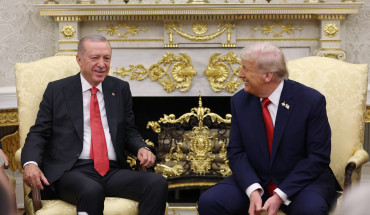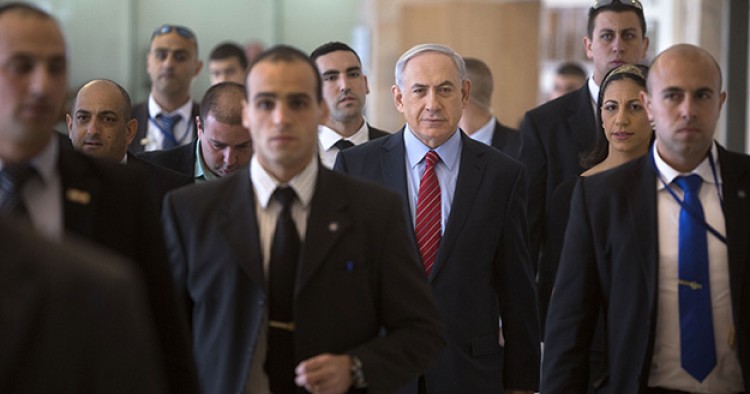There’s an expression in Israel along the lines of “people are scrupulously honest with pollsters, then they get into the voting booth and lie like hell.” It is important to bear this chestnut in mind as one scans survey returns regarding prospects for the major parties in the upcoming elections.
Three polls in particular—Channels 10 and 2 and the Walla News Poll—produced interesting averaged results.[1] Perhaps unsurprisingly, since Prime Minister Benjamin Netanyahu called for early elections, Likud would gain four seats, up to 22 from 18. The Jewish Home party of Avigdor Lieberman, the current foreign minister, would do quite well, increasing its presence from 12 seats to 17. The Yisrael Beiteinu (Israel Home) party, the right-wing faction led by Naftali Bennett, would lose one seat, perhaps because of infighting between Bennett and the housing minister, Uri Ariel, who has advocated replacing the al-Aqsa Mosque with a reconstructed Biblical temple. They might split into two separate lists, which would give committed far-right voters an option they might feel they lack at this stage. United Torah Judaism (UTJ) and Shas, the Ashkenazic and Sephardic religious parties, would fare differently, with Shas losing three seats, going from 11 to eight, and UTJ picking up a seat, edging forward from its current seven to eight.
Former Likud Welfare Minister Moshe Kahlon, a true wild card, looks as though his yet unnamed—and unformed—reformist party could garner 11 seats across the political spectrum. In announcing his intention on December 3 at Haifa University to create a new party,[2] he received an uncommonly rapturous response. As a proponent of settlements and an opponent of Palestinian statehood, he would be a natural coalition ally for Netanyahu in a post-election government.
On the political center-left and left, the future holds little in the way of glittering promise. Labor, led by the anti-charismatic Isaac Herzog, would shrink by two seats, descending from 15 to 13. Kadima, (Forward), the party founded by Ariel Sharon at the turn of the century, would be eliminated from the Knesset. Hatnua (The Movement), led by Tzipi Livni, a backer of the peace process, would lose two seats, sinking from six to four. In contrast, Meretz (Vigor), whose banner reads “Israel’s Left,” would hang on to its six seats. The real devastation, however, would be visited on media celebrity Yair Lapid’s Yesh Atid (There is a Future) party, which would nearly halve its Knesset representation, sliding from 19 to 10. The Arab parties would likely lose one of their current 11 seats.
At this stage, the Left has been unable to decide whether or not to form a bloc that might produce a new and very different government, let alone take over the prime minister’s office. Shelly Yachimovich, the former Labor leader and media figure, has bitterly deplored the idea of a link to Lapid’s Yesh Atid, undermining the credibility of her successor’s pragmatic pitch for just such an arrangement. Unless and until the Left can agree on a prospective coalition and who would lead it, the advantage will lie with the parties on the right of the political spectrum. At this stage, the closest these party leaders have gotten to forming a bloc is to consider a mutual pledge not to join a Netanyahu-led coalition.
What the Israeli public wants out of this election is hard to gauge. The social media are awash in “anyone but Bibi, “We are stuck with Bibi,” and “Bye Bye Bibi” slogans. There is clearly dissatisfaction, reflected in his approval ratings, with Netanyahu’s performance. One poster plastered over urban bus stops asks riders, “Years of neglect left you stuck at the station with no buses? Israel is stuck with Bibi,” while others adhered to supermarkets say, “Prices are going up, salaries are stuck. Israel is stuck with Bibi.” The unresolved aftermath of the most recent Gaza conflict, internecine bickering within the coalition, uneven economic news, and a sense of drift have alienated many voters and left others feeling detached.
Both Shas and Yesh Atid seem to be emphasizing the economic angle. This would seem to be prudent politics. In a recent opinion poll, 49 percent of Israelis identified cost of living as the most important issue facing the next government, with security concerns a distant second (21 percent).[3] Netanyahu still commands a leading position on that front, if for no other reason than his lack of political rivals with compelling military credentials. Some in Labor are pinning their hopes on former Air Force commander Amos Yadlin for this role, which he is thought to covet. But thus far he seems not to figure prominently in pre-election musical chairs.
And thus far the opposition has not proffered a mobilizing vision. Moshe Kahlon’s burgeoning popularity might point to an underlying trend that is not particularly new: a creeping public perception that the government has abandoned ordinary Israelis. Kahlon was a central player in the government’s response to the “cottage cheese” revolt two years ago, in which the price of that savory commodity came to symbolize the weakened economic position of Israel’s everyman. He got high marks mainly because Israelis thought that he understood and sympathized with their plight. Indeed, Netanyahu urged his other ministers to be more Kahlon-like in their public self-presentation.[4]
Given the electoral volatility of the great Israeli middle, it is conceivable that Kahlon could wind up deciding whether the next coalition leans to the right or the left. Given his Likud affiliation, the former seems more likely, though Kahlon intriguingly said yesterday that, unlike Netanyahu, he is “one of the Likudniks who realize that territorial concessions will have to be made” and that he “will not turn down a chance for peace.”[5]
Yet for those reading the tea leaves for a renewed peace process emerging from the elections, the viability of the two-state solution is not the animating factor in the intense jockeying for primacy that will take place between now and the election, although Tzipi Livni has made the two state issue her slogan: “An extremist state or a Zionist state.” While a new center-left coalition—as unlikely as this seems right now—would create opportunities for diplomacy, the absence of diplomacy appears not to have generated Israel’s current political turbulence.
[1] Britain Israel Communications and Research Centre, “Dialog/Channel 10 poll on 2 December 2014,” http://www.bicom.org.uk/opinion-poll/dialogchannel-10-poll-2-december-2014/; “Midgam/Channel 2 poll on 2 December 2014,” http://www.bicom.org.uk/opinion-poll/midgamchannel-2-poll-on-2-december-2014/; “Walla/ Teleseker poll on 3 December 2014,” http://www.bicom.org.uk/opinion-poll/23326/.
[2] Adiv Sterman, “Popular Ex-Likud Minister Launches New Party,” The Times of Israel, December 3, 2014, http://www.timesofisrael.com/popular-ex-likud-minister-launches-new-party/.
[3] See “Panels/Knesset Channel Poll: 53% Netanyahu Responsible for Collapse of Government,” Jeremy’s Knesset Insider, December 5, 2014, http://knessetjeremy.com/2014/12/05/panelsknesset-channel-poll-53-netanyahu-responsible-for-collapse-of-government/.
[4] See “Popular Likud Minister Kahlon Quits Politics,” The Jerusalem Post, October 14, 2012, http://www.jpost.com/Diplomacy-and-Politics/Popular-Likud-Minister-Kahlon-quits-politics.
[5] Email correspondence with author’s source, December 5, 2014.
The Middle East Institute (MEI) is an independent, non-partisan, non-for-profit, educational organization. It does not engage in advocacy and its scholars’ opinions are their own. MEI welcomes financial donations, but retains sole editorial control over its work and its publications reflect only the authors’ views. For a listing of MEI donors, please click here.













